人教版小学五年级英语下册知识点整理
小学英语人教版PEP五年级下册1-6单元知识点总结

Unit1 My day一、基本句型1.询问什么时候做某事:- When do you ……?你什么时候……?- I usually…at …. 我通常在…(点钟)…。
例:-When do you eat breakfast?-I eat breakfast at 7:00.2.What do you do on the weekend?你周末做什么?- I +频率副词+周末活动+时间。
或Sometimes I+周末活动例句:I sometimes go shopping with my mum on the weekend.(周末我时候和妈妈一起去购物)二、知识点:1.频率副词:always(总是,一直)>usually(通常)>often(经常)>sometimes(有时)2.只有Sometimes可以放在句首。
(Sometimes I cook dinner.)3.On the weekend 在周末on Saturdays 在周六on Sundays在周日(别忘加s)Unit2 My favourite season1.-Which season do you like best? (你最喜欢哪个季节?)Why?(为什么)-I like +季节+ best.(I like spring∕summer∕fall∕winter best) Because ___________.(因为)或:-What‘s your favourite season? -My favourite season is spring∕summer∕fall∕winter.2.-Why do you like winter best?(你为什么最喜欢冬天?) -Because______.二、知识点:1.leaf(树叶):复数leaves2.W,W真神奇,问出许多大问题。
what,what,问“什么”,when,when,问“时间”,where,where,问“哪里”,which,which,“哪一个”,why,why,“为什么”.Unit3 My school calendar补充:1.Dragon Boat Festival 龙舟节或端午节(农历五月五日)一般在阳历6月2.月份首字母大写。
人教版小学五年级下册英语知识点整理
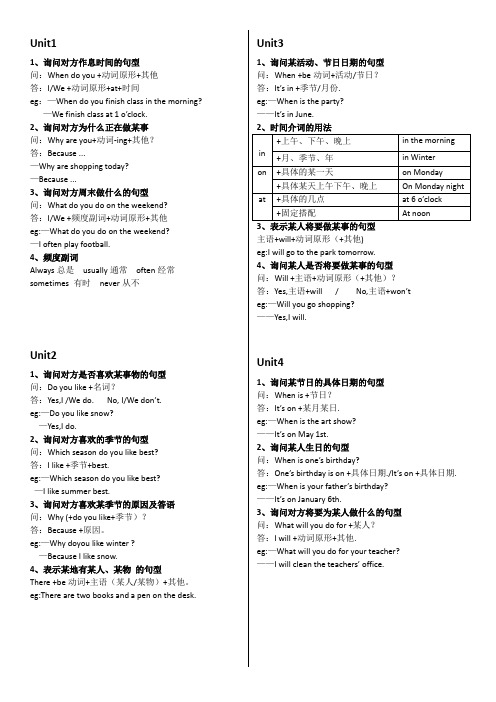
Unit11、询问对方作息时间的句型问:When do you +动词原形+其他答:I/We +动词原形+at+时间eg:—When do you finish class in the morning?—We finish class at 1 o’clock.2、询问对方为什么正在做某事问:Why are you+动词-ing+其他?答:Because ...—Why are shopping today?—Because ...3、询问对方周末做什么的句型问:What do you do on the weekend?答:I/We +频度副词+动词原形+其他eg:—What do you do on the weekend?—I often play football.4、频度副词Always总是usually通常often经常sometimes 有时never从不Unit21、询问对方是否喜欢某事物的句型问:Do you like +名词?答:Yes,I /We do. No, I/We don’t. eg:—Do you like snow?—Yes,I do.2、询问对方喜欢的季节的句型问:Which season do you like best?答:I like +季节+best.eg:—Which season do you like best?—I like summer best.3、询问对方喜欢某季节的原因及答语问:Why (+do you like+季节)?答:Because +原因。
eg:—Why doyou like winter ?—Because I like snow.4、表示某地有某人、某物的句型There +be动词+主语(某人/某物)+其他。
eg:There are two books and a pen on the desk.Unit31、询问某活动、节日日期的句型问:When +be动词+活动/节日?答:It’s in +季节/月份.eg:—When is the party?——It’s in June.主语+will+动词原形(+其他)eg:I will go to the park tomorrow.4、询问某人是否将要做某事的句型问:Will +主语+动词原形(+其他)?答:Yes,主语+will / No,主语+won’t eg:—Will you go shopping?——Yes,I will.Unit41、询问某节日的具体日期的句型问:When is +节日?答:It’s on +某月某日.eg:—When is the art show?——It’s on May 1st.2、询问某人生日的句型问:When is one’s birthday?答:One’s birthday is on +具体日期./It’s on +具体日期. eg:—When is your father’s birthday?——It’s on January 6th.3、询问对方将要为某人做什么的句型问:What will you do for +某人?答:I will +动词原形+其他.eg:—What will you do for your teacher?——I will clean the teachers’ office.1、描述物品归属的句型物品+ be动词(is/are)+(mine/his/hers/yours/ours/theirs) eg:The book is yours.2、确认物品归属地句型问:be动词+this/that/these/those(+其他)+某人的?答:Yes,it is. Yes,they are./ No,it,is’t. No,they aren’t. eg:—Is that crayou his?——Yes,it is.3、询问物品归属的句型问:单数Whose+is it/this/that?复数Whose+are they/these/those?答:It’s/They’re+名词性物主代词/ 名词所有格eg:—Whose bag is this?——It’s mine.4、现在进行时的一般疑问句问:Be动词+主语+动词-ing(+其他)?答:Yes,主语+be动词/ No,主语+be动词+not. eg:—Is she listening to music?——Yes,she is.5、描述某人正在做某事主语+be动词(am/is/are)+动词-ing(+其他).eg:I’m doing my homework now.6、询问某人能否做某事问:Can+主语+动词原形+其他?答:Yes,主语+can. /No,主语+can’t.eg:—Can I play football?——Yes,you can.Unit61、询问多个人或动物正在做什么的句型问:What are +主语(复数)+doing?答:主语(复数)+are+动词-ing+其他.eg:—What are the boys doing?——They are jumping2、询问单个人或动物正在做什么的句型问:What is +主语(单数)+doing?答:主语(单数)+is+动词-ing+其他.eg:—What is Tom doing?——He is playing football.。
人教版202X五年级英语下册知识点梳理思维导图
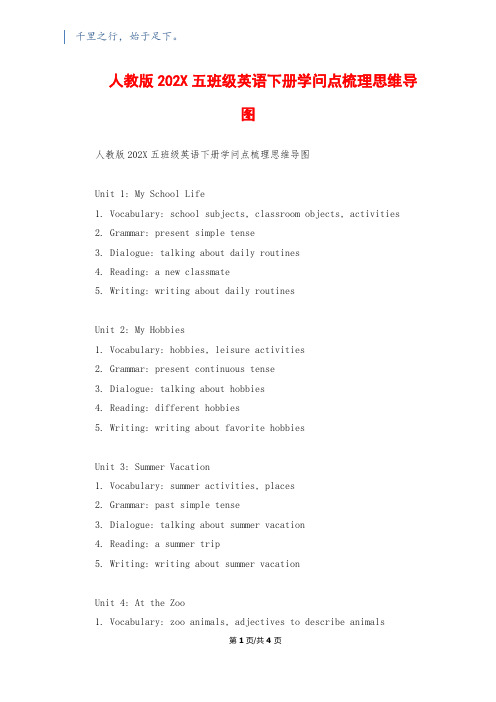
人教版202X五班级英语下册学问点梳理思维导图人教版202X五班级英语下册学问点梳理思维导图Unit 1: My School Life1. Vocabulary: school subjects, classroom objects, activities2. Grammar: present simple tense3. Dialogue: talking about daily routines4. Reading: a new classmate5. Writing: writing about daily routinesUnit 2: My Hobbies1. Vocabulary: hobbies, leisure activities2. Grammar: present continuous tense3. Dialogue: talking about hobbies4. Reading: different hobbies5. Writing: writing about favorite hobbiesUnit 3: Summer Vacation1. Vocabulary: summer activities, places2. Grammar: past simple tense3. Dialogue: talking about summer vacation4. Reading: a summer trip5. Writing: writing about summer vacationUnit 4: At the Zoo1. Vocabulary: zoo animals, adjectives to describe animals第1页/共4页2. Grammar: can/can't for ability3. Dialogue: talking about animals at the zoo4. Reading: a visit to the zoo5. Writing: writing a report about the zoo animalsUnit 5: In the Countryside1. Vocabulary: nature, countryside, weather2. Grammar: present perfect tense3. Dialogue: talking about countryside activities4. Reading: life in the countryside5. Writing: writing a blog about a countryside tripUnit 6: My Family1. Vocabulary: family members, adjectives to describe family members2. Grammar: possessive pronouns3. Dialogue: talking about family members4. Reading: a family tree5. Writing: writing about family membersUnit 7: Festivals and Customs1. Vocabulary: festivals, customs, traditions2. Grammar: future tense3. Dialogue: talking about festivals and customs4. Reading: different festivals around the world5. Writing: writing about a festivalUnit 8: Helping Others1. Vocabulary: community helpers, volunteer work2. Grammar: imperative sentences3. Dialogue: talking about helping others4. Reading: different ways to help others5. Writing: writing about a volunteering experienceUnit 9: Sports and Games1. Vocabulary: sports, games, equipment2. Grammar: comparative and superlative adjectives3. Dialogue: talking about sports and games4. Reading: different sports and games5. Writing: writing about a favorite sport or gameUnit 10: Outings1. Vocabulary: outdoor activities, transportation2. Grammar: prepositions of place and time3. Dialogue: talking about outings4. Reading: a school outing5. Writing: writing a diary entry about an outingUnit 11: Food and Drink1. Vocabulary: food, drinks, healthy eating2. Grammar: countable and uncountable nouns3. Dialogue: talking about food and drink4. Reading: a visit to a farm5. Writing: writing a recipeUnit 12: My Country1. Vocabulary: countries, cities, landmarks2. Grammar: past continuous tense3. Dialogue: talking about countries and cities第3页/共4页4. Reading: a travel brochure5. Writing: writing about a dream vacation以上是人教版202X五班级英语下册的学问点梳理思维导图,包括词汇、语法、对话、阅读和写作等内容,挂念同学系统地整理和学习课程学问,提高英语综合力量。
完整版)人教版五年级下册英语知识点整理
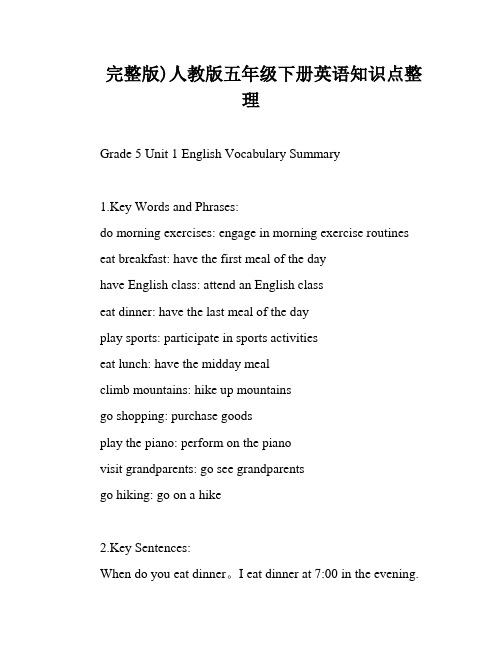
完整版)人教版五年级下册英语知识点整理Grade 5 Unit 1 English Vocabulary Summary1.Key Words and Phrases:do morning exercises: engage in morning exercise routines eat breakfast: have the first meal of the dayhave English class: attend an English classeat dinner: have the last meal of the dayplay sports: participate in sports activitieseat lunch: have the midday mealclimb mountains: hike up mountainsgo shopping: purchase goodsplay the piano: perform on the pianovisit grandparents: go see grandparentsgo hiking: go on a hike2.Key Sentences:When do you eat dinner。
I eat dinner at 7:00 in the evening.When do you get up。
I usually get up at 12:00 at noon.What do you do on the weekend。
Usually。
I watch TV and go shopping。
Sometimes。
I go hiking.I often play football.3.Important Points:Synonyms: eat breakfast - have breakfast。
eat lunch - have lunch。
人教版英语五年级下册知识点1-3单元
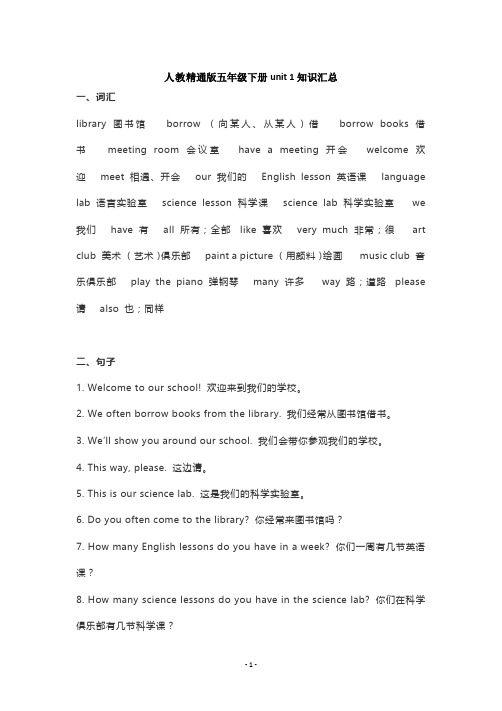
人教精通版五年级下册unit 1 知识汇总一、词汇library 图书馆 borrow (向某人、从某人)借 borrow books 借书 meeting room 会议室have a meeting 开会welcome 欢迎meet 相遇、开会our 我们的English lesson 英语课language lab 语言实验室science lesson 科学课science lab 科学实验室 we 我们have 有all 所有;全部 like 喜欢very much 非常;很 art club 美术(艺术)俱乐部paint a picture (用颜料)绘画 music club 音乐俱乐部play the piano 弹钢琴many 许多 way 路;道路 please 请also 也;同样二、句子1. Welcome to our school! 欢迎来到我们的学校。
2. We often borrow books from the library. 我们经常从图书馆借书。
3. We’ll show you around our school. 我们会带你参观我们的学校。
4. This way, please. 这边请。
5. This is our science lab. 这是我们的科学实验室。
6. Do you often come to the library? 你经常来图书馆吗?7. How many English lessons do you have in a week? 你们一周有几节英语课?8. How many science lessons do you have in the science lab? 你们在科学俱乐部有几节科学课?9. We have one science lesson in the science lab.我们在科学俱乐部有一节科学课。
人教版五年级英语下册Unit4-知识点整理

Unit4 When is Easter?知识点整理△话题:询问某一节日的具体日期以及某人的生日是哪天,并进行回答△重点词汇:△一般词汇:April Fool’s Day, special, love, Miss, Mr., birthday 愚人节特别的喜爱小姐先生生日cook noodles, delicious, both of, kitten, diary, still 煮面条美味的两者(都) 小猫日记仍然noise, fur, open, walk, pink, blue, white, hungry 噪音软毛开着的行走粉色的蓝色的白色的饥饿的△句型:①询问某一节日/活动的具体日期When is April Fool’s Day?愚人节是哪天?——It’s on April 1st. 它在4月1日。
【句型结构】问句:When is+节日/活动?答语:It’s on+具体日期(几月几日)。
②表达某人的生日是哪天When is your birthday?你的生日是哪天?——My birthday is on July 23rd. / It’s on July 23rd.我的生日是7月23日。
【句型结构】问句:When is+one’s birthday?答语:One’s birthday on+某月某日 / It’s on+某月某日。
【拓展:one’s可以是形容词性物主代词(my/your/his/her...),也可以是名词所有格(John’s/your mother’s/Miss chen’s...)】③询问他们正在谈论哪个月份Which month are they talking about?他们正在谈论哪个月份?——April. 四月。
△知识点:1.on+具体的日期(几月几日/节日) on April 1st / on Children’s Day2.序数词的缩略形式:阿拉伯数字+单词的最后两个字母3.一般情况下,序数词前要用the. 如:①the first floor 在一楼②Summer is the second season in a year. 夏天是一年当中的第二个季节。
人教版PEP英语五年级下册Unit1-My-Day知识点归纳与练习(含答案)
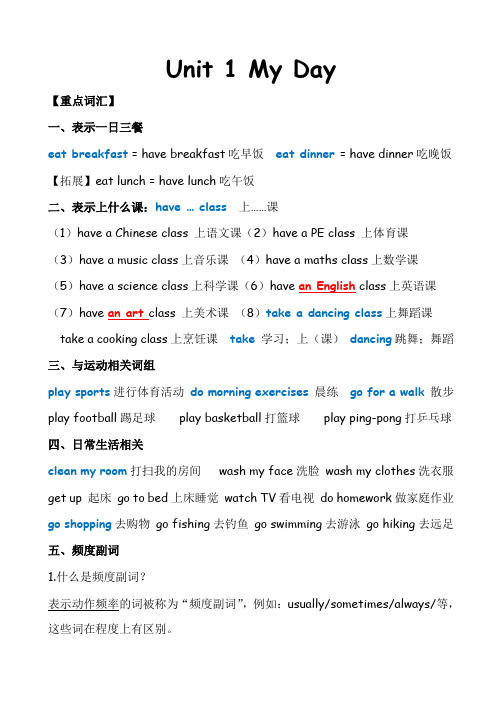
Unit 1 My Day【重点词汇】一、表示一日三餐eat breakfast = have breakfast吃早饭eat dinner= have dinner吃晚饭【拓展】eat lunch = have lunch吃午饭二、表示上什么课:have … class 上……课(1)have a Chinese class 上语文课(2)have a PE class 上体育课(3)have a music class上音乐课(4)have a maths class上数学课(5)have a science class上科学课(6)have an English class上英语课(7)have an art class 上美术课(8)take a dancing class上舞蹈课take a cooking class上烹饪课take学习;上(课)dancing跳舞;舞蹈三、与运动相关词组play sports进行体育活动do morning exercises晨练go for a walk散步play football踢足球play basketball打篮球play ping-pong打乒乓球四、日常生活相关clean my room打扫我的房间wash my face洗脸wash my clothes洗衣服get up 起床go to bed上床睡觉watch TV看电视do homework做家庭作业go shopping去购物go fishing去钓鱼go swimming去游泳go hiking去远足五、频度副词1.什么是频度副词?表示动作频率的词被称为“频度副词”,例如:usually/sometimes/always/等,这些词在程度上有区别。
2.常见频度副词按频率大小排列如下:always(100%)>usually(80%)>often(60%)>sometimes(20%~40%)> never (0%)3.注意频度副词的使用位置:①We usually go to school at seven in the morning.②What do you often do on the weekend?六、常见时间的表达方式1.at + 具体的几点钟;at noon在中午;at night在晚上2.in +月份/季节/早中晚例如:in the morning/afternoon/evening3.关于on表示时间的几种情况:①on + 星期几;②on + 几月几日;③on the weekend在周末;④on Monday morning星期一早上。
人教版PEP小学英语五年级下册知识点汇总(最新)
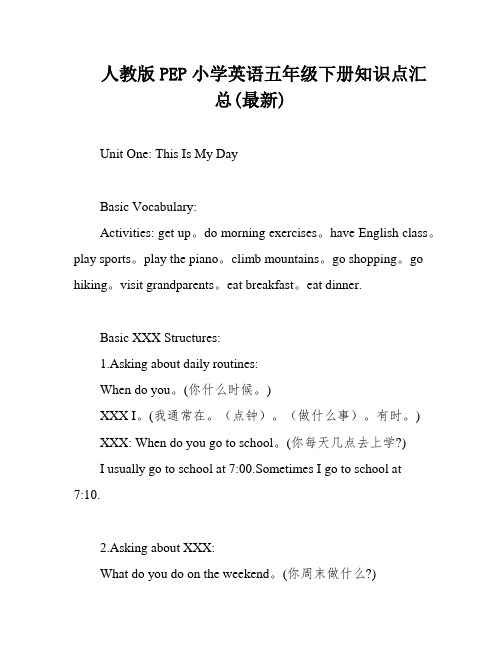
人教版PEP小学英语五年级下册知识点汇总(最新)Unit One: This Is My DayBasic Vocabulary:Activities: get up。
do morning exercises。
have English class。
play sports。
play the piano。
climb mountains。
go shopping。
go hiking。
visit grandparents。
eat breakfast。
eat dinner.Basic XXX Structures:1.Asking about daily routines:When do you。
(你什么时候。
)XXX I。
(我通常在。
(点钟)。
(做什么事)。
有时。
)XXX: When do you go to school。
(你每天几点去上学?)I usually go to school at 7:00.Sometimes I go to school at7:10.2.Asking about XXX:What do you do on the weekend。
(你周末做什么?)XXX I。
(我通常/经常。
有时。
)XXX: What do you do on the weekend?I often play XXX I go shopping with my mom.3.Introducing one's own habits:Every weekend。
I go hiking。
(我每个周末远足。
)Every day。
I do my homework at 8:00 in the evening。
(我每天晚上8点做作业。
)4.Asking XXX:What do you do。
(你是干什么的?)Time:morning。
afternoon。
evening。
noon。
at night。
6:00.on Sunday。
- 1、下载文档前请自行甄别文档内容的完整性,平台不提供额外的编辑、内容补充、找答案等附加服务。
- 2、"仅部分预览"的文档,不可在线预览部分如存在完整性等问题,可反馈申请退款(可完整预览的文档不适用该条件!)。
- 3、如文档侵犯您的权益,请联系客服反馈,我们会尽快为您处理(人工客服工作时间:9:00-18:30)。
Unit One My Day基本词汇:Activities(活动)Time(时间)频率词get up 起床do morning exercises 晨练have English class 上英语课play sports 进行体育活动play the piano 弹钢琴go shopping 购物go hiking 去远足eat breakfast 吃早饭eat dinner 吃晚饭morning 早上in the afternoon 下午evening 晚上noon 中午at night 夜晚6:00 具体时间on Sunday 在星期天when 什么时候always 总是usually 通常often 经常sometimes 有时(频率程度依次减低)基本句型:1. 询问生活规律:---- When do you ……?你什么时候……?---- I usually… at … Sometimes I….我通常在…(点钟)…(做什么事)。
有时…E.g. --- When do you go to school ? 你每天几点去上学?--- I usually go to school at 7:00. Sometimes I go to school at 7:10.2. 询问生活习惯:--- What do you do on the weekend? 你周末做什么?--- I usually / often ….. Sometimes I …..E.g. --- What do you do on the week?--- I often play football. Sometimes I go shopping with my mom.3. 介绍自己的生活习惯:Every weekend I go swimming. 我每个周末游泳。
Every day I do my homework at 8:00 in the evening. 我每天晚上8点做作业。
4. 询问职业:--- What do you do? 你是干什么的?--- I am a doctor / nurse / policeman….5. Let’s …. 让我们….(let’s = let us )Let’s go swimming together next Sunday. 下周我们一起去游泳吧。
句型转换:1.划线提问:⑴I often go shopping on the weekend. →When do you go shopping ?⑵I often go shopping on the weekend. →What do you do on the weekend?⑶I am a student. →What do you do?⑷I go to school at 7:00. →When do you go to school?知识延伸:⑴同义词:play sports = do sportseat breakfast/ lunch/ dinner = have breakfast/ lunch/ dinnerUnit Two My Favourite Season 基本词汇:Season (季节) Weather(天气)Activity(活动)spring windy and warm plant trees/fly kitessummer sunny and hot go swimming/eat ice cream autumn (fall)windy and cool pick apples/eat fruitswinter windy and cold make a snowman/play in the snow基本句型:1. 询问喜欢哪个季节:⑴--- Which season do you like best? 你最喜欢哪个季节?--- I like +季节+ best. (例:I like spring∕summer∕fall∕winter best)--- 或:I like summer, because I can go swimming.⑵--- What is your favourite season? 你最喜爱的季节是什么?--- Spring∕summer∕fall∕winter is my favourite season.2. 询问天气:--- What is the weather like in fall in Beijing?北京秋天的天气是怎么样的?--- It is sunny and cool.3. 询问理由:--- Why do you like winter best?为什么你最喜欢冬天?--- Because I can play with snow and make a snowman.4. 询问想要做什么--- What would you like to do?--- I’d like to cook∕play sports……( I’d = I would )知识延伸:1. 特殊疑问句:⑴which引导的特殊疑问句,询问喜欢哪个季节:Which season do you like best?⑵why引导的特殊疑问句,询问喜欢某个季节的原因:Why do you like summer?⑶when 引导的特殊疑问句,询问什么时候:When is the best time to go to Beijing?2. 第三人称单数形式:say—says (说) ask—asks (问) come—comes (来)3. 单复数:tree—trees (树) leaf—leaves (叶子)4. 同义词:fall—autumn 秋天5. 多义词:fall 1.秋天2.飘落6. 同义句:Which season do you like best? ----- What’s your favourite season?7. snowy 下雪的cloudy多云的rainy下雨的8. 相似短语:play with snow 玩雪like to swim游泳( like+ to do)play in the snow 在雪地玩like swimming 游泳( like + doing)句型转换:1. 肯定句?一般疑问句:⑴I like summer. ?Do you like summer?肯定回答:Yes, I do. 否定回答:No, I don’t.⑵It is sunny and hot. ? Is it sunny and hot?肯定回答:Yes, it is. 否定回答:No, it isn’t.⑶The sky is very blue. ?Is the sky very blue?The leaves a re colourful. →Are the leaves colourful?2. 划线提问:⑴I like summer best. →Which season do you like best?⑵My favourite season is winter. →What is your favourite season?⑶It is sunny in May in Beijing. →What is the weather like in May in Beijing?⑷I’d like to swim. →What would you like to do?全写与缩写:I am = I’m you are = you’re who is = who’s do not = don’tcan not = can’t I would = I’d let us = let’s does not = doesn’t动词原形→第三人称单数形式:普通形式直接在动词后+ s:如like→likes、ask→asks、play→plays 、come→comes 特殊形式have →has do →does watch →watchesUnit 3 My school calendarmonth(月份)winter spring summer fall(autumn)December(Dec.)March(Mar.)June (Jun.)September(Sept.)January(Jan.)April(Apr.)July(Jul.)October(Oct.)February(Feb.)May August(Aug.)November(Nov.)常用节假日名称:New Year’s Day元旦(1.1)Tree Planting Day 植树节(3.12)Easter 复活节愚人节(4.1)May Day 劳动节(5.1)April Fool’s Day儿童节(6.1)Mother’s Day母亲节(每年五月的第二个星期天)Children’s Day父亲节(每年六月的第三个星期天)Teachers’ Day教师节(9.10)、China’s National Father’s DayDay国庆节(10.1)Mid-Autumn Day 中秋节(农历八月十五)Thanksgiving Day 感恩节(11月第4个周四)Christmas圣诞节(12.25)summer vacation暑假winter vacation寒假活动名称:s ports meet 运动会Easter party 复活节聚会school trip 学校旅行Chinese test 语文测试singing contest歌唱比赛birthday party生日聚会介词in 、on、at的用法:1、in后面+上午/下午/晚上/月份/季节/年份.如in the morning, in April, in winter, in 2015.2、on的后面+具体的某一天。
如:on Monday, on April 3rd, on Friday morning.12:30, at night 3、at后面+具体的时间点或与其他词构成固定搭配。
如:at six o’clock, at重点句型:1、问答某个活动或节日在几月份的句型及回答。
句型结构:问:When is+活动或节日名称?月份。
答:It’s in+例:问:When is Christmas?(圣诞节在什么时候?)(在十二月。
)答:It’s in December.2、询问别人将要做什么的句型及回答。
